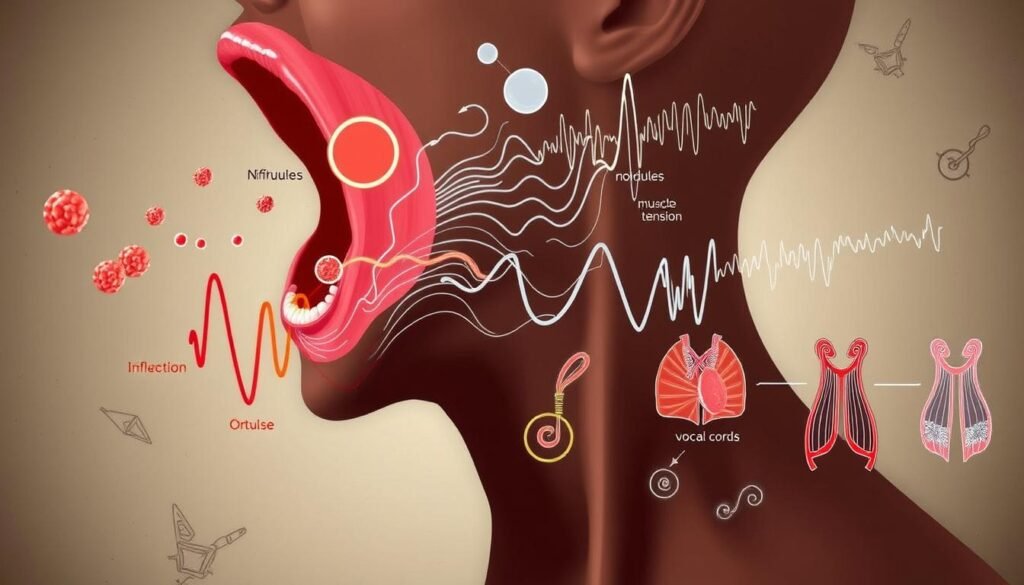Did you know hoarseness becomes more common as people age? For those under 70, about 1% experience it. This number jumps to 2.5% for people over 70. Understanding hoarseness is crucial. It changes how a person’s voice sounds—making it raspy, weak, or strained. These changes often come from problems with the vocal cords or throat. We’ll look into what causes hoarseness and its symptoms. Knowing when to seek help is important.
Key Takeaways
- Hoarseness can point to different medical issues and should not be overlooked.
- Viral infections usually cause sudden hoarseness in the upper respiratory tract.
- Lifestyle choices like smoking can lead to long-lasting hoarseness, or chronic laryngitis.
- If hoarseness persists or gets worse after a week, see a doctor.
- Doctors use tools like laryngoscopes and sound analysis to check vocal health.
- Treating hoarseness might involve voice therapy, medications, or sometimes surgery.
Understanding Hoarseness and Its Impact
Hoarseness can affect people of any age, disrupting daily activities. It makes communication hard, especially where a clear voice is key. Also, it can cause frustration, affecting one’s emotions and mental health. About 30% of individuals will experience hoarseness at some point, with a 7% prevalence currently.
Many factors can cause hoarseness. One major cause is acute laryngitis, often from a cold. Acid reflux, like GERD, is also a culprit, requiring diet watch and possibly medication. Allergies are another factor, treatable with nasal sprays and antihistamines.
Vocal misuse can lead to nodules or polyps on the vocal cords, treatable with speech therapy or surgery. If hoarseness lasts more than three weeks, especially for those over 45, it could signal something serious. Conditions like cancer or vocal cord paralysis might be the cause.
Managing these issues is key to better life quality. Resting your voice, getting speech therapy, and the right treatment are crucial. Vocal care helps prevent further problems. By understanding all this, individuals can seek help and possibly regain their confident voice.
What is Hoarseness?
Hoarseness, also known as dysphonia, involves changes in the voice. It sounds rough, raspy, and can vary in loudness or pitch. It often results from problems with the vocal cords.

Vocal cord issues can come from inflammation or infections. These usually get better on their own in a few weeks. If hoarseness lasts more than three weeks, it could be serious. It might mean laryngeal cancer or neurological issues, like Parkinson’s disease.
Overusing the voice can lead to vocal cord nodules. This causes a chronic hoarse voice that needs professional care.
It’s important to notice hoarseness signs and how long they last. Early detection and treatment are key. If hoarseness doesn’t go away or comes with symptoms like coughing up blood, get medical help.
For more about hoarseness, check this useful link. It explains symptoms and ways to treat them.
Knowing about hoarseness helps manage vocal health. Taking early action, like voice therapy, improves communication and overall health.
Hoarseness as a Symptom
Hoarseness can show there are problems that affect the voice. It’s often due to inflammation or irritation of the larynx and vocal cords. It’s important to know the laryngitis symptoms that come with hoarseness. This helps get the right treatment quickly.
Common Signs Associated with Hoarseness
Those with hoarseness might see signs of voice strain or trouble. Common signs are:
- A raspy or strained voice
- Changes in pitch or volume
- Difficulty speaking or making sounds
- A feeling of a lump in the throat
- Needing to clear the throat often
- A constant cough or dry throat
- Having trouble swallowing
Hoarseness that doesn’t go away can point to issues like laryngitis. If hoarseness lasts more than two weeks, see a doctor. It could mean something more serious.
When to Seek Medical Attention
If hoarseness lasts over three weeks, see a doctor. Especially if you have severe symptoms. These include:
- Coughing up blood
- A lump in the neck
- Pain when speaking or swallowing
- Having a hard time breathing
- Losing your voice for days
The National Institute on Deafness and Other Communication Disorders (NIDCD) says to get these symptoms checked. The type of treatment will depend on what’s wrong. You might need to change your lifestyle, take medication, or get special treatments. To learn more, visit this NIDCD resource.
Common Causes of Hoarseness
Hoarseness happens for many reasons, impacting the vocal cords and voice box. Knowing these causes helps us treat it right. Top reasons include viral infections and vocal strain.
Viral Infections and Upper Respiratory Tract Issues
Upper respiratory infections like the common cold often cause hoarseness. These usually get better by themselves in two weeks. But, ongoing coughing from these infections can make hoarseness worse. If hoarseness lasts more than a few weeks, it could point to serious problems like throat or larynx cancer.
Vocal Strain and Overuse
Too much shouting, singing, or talking can strain your voice. This strain might cause growths on the vocal cords, called vocal nodules. Also, smoking and drinking a lot can lead to hoarseness. As we get older, our vocal cords might not work as well. So, keeping an eye on our voice health is key.

| Cause | Description |
|---|---|
| Viral Infections | Common colds and throat infections leading to temporary hoarseness. |
| Vocal Strain | Overuse of the voice resulting in vocal cord growths or injuries. |
| Chronic Coughing | Can exacerbate hoarseness, often linked to respiratory issues. |
| Smoking and Alcohol | Risk factors contributing to chronic hoarseness and vocal cord damage. |
| Medical Conditions | Conditions such as GERD and allergies can also promote hoarseness. |
Laryngitis: A Major Contributor to Hoarseness
Laryngitis causes inflammation in the larynx, leading to hoarseness. It shows up as laryngitis symptoms that might make talking and feeling comfortable hard. Knowing the difference between acute and chronic laryngitis helps in treating it effectively, since each type needs a different approach.
Acute vs. Chronic Laryngitis
Acute laryngitis, which usually comes from viruses or overusing your voice, lasts a short time. Most people get better in a few weeks. In fact, it’s behind more than 40% of hoarseness cases. Chronic laryngitis sticks around longer, often more than three weeks. It’s linked to various issues, like reflux from the stomach, environmental stuff, and unhealthy habits like smoking and drinking too much. Handling each laryngitis type requires specific treatments.
| Type of Laryngitis | Description | Duration | Common Causes | Prevalence in Hoarseness Cases |
|---|---|---|---|---|
| Acute Laryngitis | Short-term inflammation | Less than 3 weeks | Viral infections, vocal strain | 42.1% |
| Chronic Laryngitis | Long-term inflammation | More than 3 weeks | Smoking, GERD, irritants | 9.7% |
If you have laryngitis symptoms for more than two weeks, it’s important to see a doctor. Catching and treating the cause early prevents worse problems later.
Other Medical Conditions Linked to Hoarseness
Hoarseness can point to other health issues, not just vocal strain. Recognizing these can help treat and manage them. Vocal quality can be impacted by mental factors or muscle disorders.
Psycho-emotional Factors
Stress, anxiety, and depression can change how your voice sounds. When people are stressed, they might not realize they’re speaking differently. This can make their voice hoarse. So, treating the emotional side of things is key, as it affects how we speak.
Neuromuscular Disorders
Issues with the nervous system can also lead to voice problems. Things like vocal cord paralysis make the voice soft and breathy. Other muscle disorders can mess with how we talk, making our voice hoarse. Finding and treating these disorders can help make the voice better.

| Condition | Effect on Voice | Treatment Options |
|---|---|---|
| Psycho-emotional Factors | Voice alterations, increased tension | Psychological support, voice therapy |
| Vocal Cord Paralysis | Soft, breathy voice | Voice therapy, surgery in some cases |
| Neurological Conditions | Disruption of normal speech patterns | Medical interventions, voice therapy |
Identifying the Symptoms of Hoarseness
Knowing how to spot hoarseness symptoms is key for proper diagnosis and treatment. The sound of a hoarse voice, if it’s wet or dry, gives clues about the cause. Alongside a rough voice, one might have a sore throat, cough, or trouble swallowing. Understanding these can help tell the difference between causes of hoarseness.
Distinguishing Factors of a Hoarse Voice
A hoarse voice has certain signs that show where it comes from. Important points include:
- Voice Quality: Describing the voice as raspy, breathy, or strained offers hints about vocal cord issues.
- Duration: If hoarseness lasts more than two weeks, it could signal something serious.
- Associated Symptoms: Additional signs like coughing, fever, or throat pain add more information.
- Voice Overuse: People who use their voices a lot for work may get hoarse from straining their vocal cords.
Associated Throat Conditions
Other throat problems that come with hoarseness give more insight. Common symptoms include:
- Sore Throat: This is usually because of viral infections that affect both the throat and vocal cords.
- Cough: A lasting cough with hoarseness might point to an infection or reflux problems.
- Difficulty Swallowing: Trouble swallowing with a hoarse voice could mean inflammation or other throat issues.
- Breathing Issues: If hoarseness and breathing problems occur together, it suggests serious vocal cord issues needing immediate care.
Diagnosis of Hoarseness
It’s vital to understand how doctors diagnose hoarseness to treat it effectively. If hoarseness lasts more than 10 days, see a specialist. An ENT doctor will likely start with a throat exam to find the cause.
Evaluation Techniques by Specialists
Doctors use different ways to figure out the reason for hoarseness. Getting a full history is a key step. They learn what might be causing the problem. They might:
- Laryngoscopy to see the vocal cords and larynx.
- Throat cultures to check for infections.
- X-rays or CT scans to look at the throat’s structure.
- Physical examination of the throat for anything unusual.
These methods help doctors make sure it’s not something serious like cancer. If hoarseness doesn’t go away, it could be a sign of a bigger problem. So, a detailed throat examination is very important early on. For more info, check out the Mayo Clinic.
Treatment Options for Hoarseness
Treatment for hoarseness depends on the cause. About one-third of people will have voice problems at some point. Most times, if it’s due to a cold, it gets better in a week or so. But, hoarseness lasting more than four weeks may be serious. It could need a specialist’s check.
Here are popular treatments for hoarse voices:
- Voice Therapy: Conducted by speech-language pathologists, this form of laryngeal therapy aims to rehabilitate vocal function and improve voice quality.
- Corticosteroids: Often recommended to reduce inflammation in cases of laryngeal swelling.
- Surgery: Indicated for structural lesions or persistent growths on vocal cords such as cysts, nodules, or polyps.
- Voice Rest: An initial remedy often suggested to enable vocal cords to heal.
Hoarseness can be caused by many things, like acid reflux or smoking. It’s important to treat the root cause. For example, voice therapy helps with spasmodic dysphonia. Surgery might be needed for vocal cord issues.
| Treatment Modality | Underlying Causes | Effectiveness |
|---|---|---|
| Voice Therapy | Vocal strain, spasmodic dysphonia | High |
| Corticosteroids | Inflammation from infections | Moderate |
| Surgery | Growths on vocal cords | Varies |
| Voice Rest | Overuse, acute laryngitis | Immediate relief |
Managing voice disorders well requires a plan made just for you. It should focus on the cause and help your voice get better.
Self-Care Tips for Managing Hoarseness
To improve vocal health, taking steps in self-care for hoarseness is key. Focus on resting your voice, staying hydrated, and keeping good vocal hygiene. These strategies help ease symptoms and support your recovery.
Voice Rest and Hydration
It’s crucial to rest your voice when you’re hoarse. Talk less and don’t whisper to avoid straining your vocal cords. Hydration is also key for a healthy voice. Drinking enough water keeps your throat moist, which is very important.
Using humidifiers can help keep the air moist, especially in dry places. Eating a balanced diet with lots of whole grains and fruits also helps with hydration. If acid reflux is a problem, try to follow a diet that helps with that.
Avoiding Irritants and Strain
Avoid smoke, allergens, and strong smells to keep your voice healthy. Smoking or being around smoke can hurt your vocal performance. Be careful with how much coffee, soda, and tea you drink, as they can dry out your throat.
Lowering stress and anxiety helps your voice too. Relaxation and enough sleep keep your vocal cords healthy. Also, gently massaging your throat and doing airflow exercises can make your voice sound better over time.
| Self-Care Tips | Description |
|---|---|
| Voice Rest | Minimize speaking to allow vocal cords to recover. |
| Hydration | Drink plenty of water and use a humidifier to keep the throat moist. |
| Avoid Irritants | Steer clear of smoke, strong scents, and allergens to protect vocal cords. |
| Healthy Diet | Consume whole grains and fruits; follow a reflux-friendly diet. |
| Stress Management | Practice relaxation techniques to reduce stress-related hoarseness. |
| Vocal Hygiene | Limit caffeine intake and practice gentle vocal exercises. |
Conclusion
Hoarseness can tell us a lot about our health. It has many causes, from colds to ongoing issues like laryngitis. It’s crucial to see how things like smoking or drinking might make it worse. If your voice stays raspy for weeks, getting help from an ENT doctor is key for the right treatment.
ENT experts use special tools like scopes and tests to find out what’s wrong. They might suggest medicines, changing your habits, or even surgery for tough cases. Keeping your throat healthy involves drinking lots of water and avoiding things that irritate it.
Knowing why you’re hoarse helps you take care of yourself better. Staying ahead of voice problems improves your life and lowers the chance of long-term issues. Being careful with your voice lets you enjoy a healthier life.